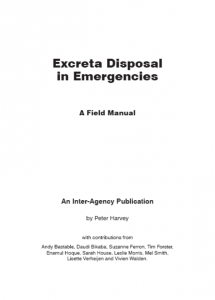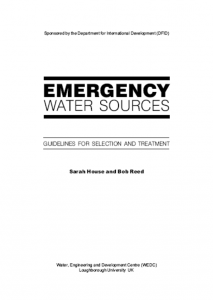The purpose of the manual is to provide practical guidance on how to select, design, construct and maintain appropriate excreta disposal systems in emergency situations. Relevant situations include natural disasters, relief for refugees and Internally Displaced Persons (IDPs), and complex emergencies, focusing on rural and peri-urban areas. The manual presents a process, which can be followed to assess the current excreta disposal needs and priorities, and to design an
appropriate programme to respond to those needs. It can also be used to select appropriate excreta disposal technologies, systems, and hygiene promotion interventions. The manual provides guidance on how to plan, design and construct systems, and how to maintain and promote appropriate use of those systems.
Archives
Excreta Disposal in Emergencies – A Field Manual (WEDC, 2007)

Emergency Sanitation (WEDC, 2002)

The book Emergency Sanitation: Assessment and programme design has been produced to assist those involved in planning and implementing emergency sanitation programmes. The main focus of the book is a systematic and structured approach to assessment and programme design. It provides a balance between the hardware (technical) and software (socio-cultural, institutional) aspects of sanitation programmes, and links short-term emergency response to long-term sustainability. The book is relevant to a wide range of emergency situations, including both natural and conflict-induced disasters, and open and closed settings. It is suitable for field technicians, engineers and hygiene promoters, as well as staff at agency headquarters.
- Tags: Compostage des Excréta, Égouts et Acheminement des Excréta, Gestion des Excréta, Gestion des Excréta, Réutilisation des Excréta / Urine, Toilettes Communautaires, Toilettes Communautaires, Toilettes Familiales, Toilettes Familiales, Traitement des Excréments, Traitement des Excréments, Vidange et Transport d'Excréta, and Vidange et Transport d'Excréta.
Emergency Water Sources (WEDC, 1997)

These guidelines have been designed to help those involved in the assessment of emergency water sources to collect relevant information in a systematic way, to use this information to select a source or sources and to determine the appropriate level of treatment required to make the water suitable for drinking.
- Tags: Approvisionnement en Eau, Camions Citerne, Collecte des Eaux de Pluie, Contrôle et Suivi de la Qualité de l'Eau, Eaux Souterraines, Évaluations EHA, Évaluations EHA, Forages, Gestion de Programmes EHA, Gestion de Programmes EHA, Plans pour la Sécurité en Eau, Pompage d'Eau, Pompe Manuelle, Prospection d'Eau, Protection des Sources, Puits Creusés à la Main, Puits Forés, Réseaux d'Adduction d'Eau, Stockage de l'Eau, Suivi et Evaluation EHA, Suivi et Evaluation EHA, Traitement de l'Eau, and Traitement de l'Eau au Ménage. Languages: Anglais, Anglais, and Anglais. Categories: Directives d'Urgence EHA, Directives d'Urgence EHA, Documents de Référence EHA, Documents de Référence EHA, and Documents de Référence EHA.
 Français
Français
